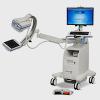Hysterectomy & its Future Role in Uterine Health

According to medical literature, hysterectomy dates from the time of Hippocrates,1 but is it time to reassess its role in the treatment of uterine disorders in the modern era?
Given it is one of the most common gynaecologic procedures, it is of the utmost importance to evaluate and consider all risk factors, including operative outcomes, direct hospital costs and broader impact on quality of life.
Clearly, one of the biggest impacts of hysterectomy is that it is major surgery which carries an elevated risk profile, and in instances where the ovaries are removed, it will trigger the onset of menopause, often prematurely. For many females, the removal of their uterus may also diminish their sense of ‘womanhood’ and adversely change how they feel about themselves. This means it is essential to look beyond hysterectomy and consider offering women more minimally invasive surgical procedures that preserve the uterus.
For some women, hysterectomy is their preferred treatment choice after a long and frustrating journey of managing a uterine disorder, for example menorrhagia (or heavy menstrual bleeding). If this is their preferred option, this must be respected, but it is crucial to ensure all options are presented and explained clearly so they feel empowered in their choice.
With different treatment options available, we need to make a conscious effort not to default to hysterectomy. The last few years have seen huge strides being made in surgical innovation in this field, we must ensure women feel the benefit of this.
Stewart EA, Shuster LT, Rocca WA. Reassessing Hysterectomy. Minn Med. 2012 Mar; 95(3): 36–39.
















